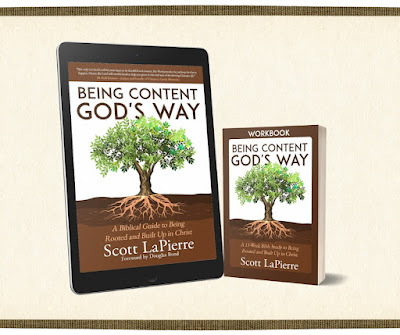Matthew James Elliott's Blog, page 2
August 10, 2025
Reflecting on Hebrews: Finding a Quiet Place in a Loud World
♱♱♱
So let us come boldly to the throne of our gracious God. There we will receive his mercy, and we will find grace to help us when we need it most. ~ Hebrews 4:16 (NLT)
♱♱♱
Life is stressful. The weight of it all can be crushing, and sometimes we just need a moment to step out from under the pressure. For me, that escape is a walk on the trails around my hometown. I've walked these paths in all kinds of emotional states—anxious, depressed, and sometimes so joyful I could almost skip. In these moments, when life's chaos threatens to overwhelm, I take a step back and just be alone. Finding these peaceful moments in the wild is how I embrace my surroundings and connect with God. It's the biggest source of calm for my mind.
 As a writer, these walks are essential for me. When I hit a wall with a story or need to work through a tough life situation, I know the trail is where I'll find clarity. Out there, I can focus my attention on seeking God's direction, taking my concerns to Him fully. Our minds can be a battlefield of distracting thoughts. These moments of silence and worship on the trail show me that I can overcome those struggles.
As a writer, these walks are essential for me. When I hit a wall with a story or need to work through a tough life situation, I know the trail is where I'll find clarity. Out there, I can focus my attention on seeking God's direction, taking my concerns to Him fully. Our minds can be a battlefield of distracting thoughts. These moments of silence and worship on the trail show me that I can overcome those struggles.My mind is always running in a million directions, so finding a quiet place to step away from the world gives me the freedom to relax. I can let my mind wander, and while it doesn't always go where I want it to—sometimes those anxious or depressing thoughts creep in—I always gain perspective. Finding quiet places in our lives is a great way to break through the mental blocks that keep us stuck. For writers, it's the perfect way to figure out a plot line or what a character will do next. Is your character going to have this experience or that one? Finding your own quiet place can help you sort it all out.
 One of the most powerful things that comes to mind during my walks is how scripture can intertwine with my stories. When I wrote my book, The Hope of Inheritance, I devoted the entire novel to the concept of outlining the book of Hebrews in a story. To do this, I read the book of Hebrews over and over and over again. Many times on my walks, I'd have a passage from Hebrews come to mind that helped me develop the story and my characters. While scripture doesn't have to be the motivating factor behind how you write, I always try to make it the foundation of my stories.
One of the most powerful things that comes to mind during my walks is how scripture can intertwine with my stories. When I wrote my book, The Hope of Inheritance, I devoted the entire novel to the concept of outlining the book of Hebrews in a story. To do this, I read the book of Hebrews over and over and over again. Many times on my walks, I'd have a passage from Hebrews come to mind that helped me develop the story and my characters. While scripture doesn't have to be the motivating factor behind how you write, I always try to make it the foundation of my stories.I want readers to see God's place in my stories and how learning from both scripture and life experience can be woven into the pages I create. For The Hope of Inheritance, the foundation of Hebrews was the defining factor in how the story came to life. The story follows four men who share their experiences with a scribe named Nathaniel to create a single narrative. As they live their lives, they begin to work through the concepts presented in the book of Hebrews. I used the characters to explore what it means to have a true high priest and to develop plotlines based on their individual walks with Christ.
 Ultimately, my time on the trail is more than just a walk; it’s a form of active meditation and worship. It’s where I find the peace to quiet my mind, to hear God’s voice, and to allow my creativity to flow. Whether you’re a writer, an artist, or simply someone struggling with the everyday stresses of life, I encourage you to find your own quiet place. It could be a local trail, a peaceful park bench, or even just a few moments of silence in a busy room. Whatever it is, embrace that peace. Allow it to be your foundation, your source of inspiration, and the anchor that holds you steady when the storms of life begin to rage.
Ultimately, my time on the trail is more than just a walk; it’s a form of active meditation and worship. It’s where I find the peace to quiet my mind, to hear God’s voice, and to allow my creativity to flow. Whether you’re a writer, an artist, or simply someone struggling with the everyday stresses of life, I encourage you to find your own quiet place. It could be a local trail, a peaceful park bench, or even just a few moments of silence in a busy room. Whatever it is, embrace that peace. Allow it to be your foundation, your source of inspiration, and the anchor that holds you steady when the storms of life begin to rage.See you in the pages,
M. J. E.
July 27, 2025
Giving AI a Chance Part III: A Ballad for you!
I thought I'd keep this AI experiment going. This time, I asked it to turn my award-winning book, The Hope of Inheritance, into a ballad. It took quite a few tries, but I think this one did a pretty good job. I may have to write one of my own, LOL. It has been such a long time since I've written any poetry. Who knows, it could be fun. Is there something you'd like to see with this experiment? Let me know in the comments, either here on the website or on the social media platform you found this on.
See you in the pages or in AI's algorithm,
M.J.E.

The Hope of Inheritance: A Ballad
(Verse 1)
When Nero's rage consumed the town,
And shadows crept from crown to crown,
A chilling dread gripped every soul,
As fiery judgments took their toll.
Yet whispered words, a steady plea,
"Fear not, though persecution be!"
(Verse 2)
The faithful faced a choice severe,
To stand and die, or flee in fear.
With trembling hearts, and spirits tried,
They sought a place where truth could hide.
From Rome's dark grasp, they turned away,
To find new hope in a brighter day.
(Verse 3)
Though Lysias' wrath, like thunder roared,
And cruel decrees by him were poured,
Against the Saints, with bitter ire,
He stoked the persecuting fire.
Yet, even as the walls did loom,
They trusted God, dispelling gloom.
(Verse 4)
For Paul and Luke, with steadfast gaze,
Led forth the flock through weary days.
"Though trials come, and paths diverge,"
They preached, "Let God your spirit urge!"
With every step, a silent prayer,
They laid their burdens in God's care.
(Verse 5)
Young Nathaniel, with pen in hand,
Documented journeys, through the land.
Of scattered sheep, and trials deep,
Whose trusting hearts God swore to keep.
Theophilus, with hidden grace,
Showed God's own mercy in that place.
(Verse 6)
No terror's grip, nor threat of sword,
Could break their trust in Christ the Lord.
Though forced to flee, from home and kin,
A deeper peace resided in
The hearts that chose to walk by faith,
And overcome the grip of death.
(Verse 7)
For 'Hope of Inheritance' truly found,
Was not in Rome, but holy ground
Within their souls, a sacred flame,
That echoed God's unchanging name.
They fled the city, scarred and torn,
But to a greater purpose, born.
July 17, 2025
Giving AI a Chance Part II: Analyzing the Story
With how intrigued I was with AI's summary of my new release of the award-winning book, The Hope of Inheritance, I asked AI to analyze the story's themes and concepts. I have to say, it's pretty close to where my intentions were with the story as it came to mind. But what do you think? If we were to continue this little experiment, what should we have AI do with it next? I'm open to keeping the fun going, but if you're not a fan, please don't feel like you have to keep delving into my chaotic madness. LOL.
See you in the pages, or through AI's algorithm,
M.J.E.
 "The Hope of Inheritance: A Kedoshim Story" by Matthew James Elliott is not merely a historical retelling but a deeply resonant analysis of faith, perseverance, and the human spirit in the face of unimaginable adversity. Set against the backdrop of the brutal Roman persecution of Christians following the Great Fire of 64 AD, the novel delves into the very essence of what it means to hold onto hope when all earthly comforts are stripped away.
"The Hope of Inheritance: A Kedoshim Story" by Matthew James Elliott is not merely a historical retelling but a deeply resonant analysis of faith, perseverance, and the human spirit in the face of unimaginable adversity. Set against the backdrop of the brutal Roman persecution of Christians following the Great Fire of 64 AD, the novel delves into the very essence of what it means to hold onto hope when all earthly comforts are stripped away.Themes: The most prominent themes woven throughout the narrative are persecution and suffering, unwavering faith, and the enduring power of hope. The book graphically depicts the inhumane torture and martyrdom faced by early believers, highlighting their willingness to sacrifice everything for their convictions. This suffering, however, serves as a crucible, refining their faith and forging an unbreakable bond within the Christian community. The concept of "inheritance" extends beyond physical safety or material wealth, pointing towards a spiritual and eternal reward, which becomes the ultimate source of their hope. Grief and loss are also deeply explored, particularly through the experiences of characters like Luke and Paul, who witness the decimation of their flock, yet find strength in their shared purpose and divine calling. The theme of community and fellowship is crucial, as the rebuilding efforts and mutual support among believers underscore the resilience of the Church.
Historical Context and Interpretation: The novel effectively utilizes the documented historical events of Nero's reign and the persecution of Christians as a foundational canvas. It immerses the reader in the terror of the era, portraying Nero as a cruel and capricious emperor who unjustly blames Christians for the fire. While a work of biblical historical fiction, it aims to illustrate the "reality of what the Early Church and its leaders were forced to endure," providing a visceral sense of their plight without gratuitous brutality. The integration of actual historical figures like Luke, Paul, Peter, and John Mark lends authenticity, grounding the fictional narrative in historical possibility.
Author's Purpose and Message: As revealed in the author's note, the book transcends historical recreation, serving as a deeply personal exploration inspired by Elliott's own struggles and his profound connection to the Book of Hebrews. This personal dimension imbues the narrative with a powerful message: hope can be found and restored even in the midst of extreme adversity and loss. The letter to the Hebrews, with its emphasis on faith, perseverance, and the unseen hope, clearly serves as a theological and emotional compass for the story. The author's intention is not merely to recount events but to demonstrate how faith can provide solace, purpose, and ultimately, triumph over seemingly insurmountable challenges. The novel suggests that profound suffering can lead to deeper understanding and a stronger connection to divine purpose.
Literary Style and Narrative Choice: The use of letters and reflections (particularly Luke's correspondence to John Mark and Theophilus, and Nathaniel's narration) is an effective literary device. It allows for a multi-faceted perspective, providing intimate insights into the characters' thoughts, fears, and unwavering convictions. This epistolary style also enhances the sense of historical documentation, mirroring the biblical letters that inspired the work. Nathaniel's role as a scribe and Luke's apprentice offers a grounded, observational viewpoint, enabling the reader to experience the horrors and hopes alongside the characters. The language, while accessible, maintains a reverence suitable for its biblical themes, drawing heavily on the New Living Translation for scriptural references, further integrating the religious context into the narrative fabric.
Character Development and Roles: The characters, though historical figures, are portrayed with emotional depth. Luke emerges as a steadfast chronicler and compassionate caregiver, tirelessly working to document and support the suffering Church. Paul is depicted as a resilient leader, continuously striving to rebuild and strengthen the community despite his own trials. Figures like John Mark and Timothy represent the next generation of leaders, carrying the torch of faith forward. Peter's inclusion underscores the collective suffering of the apostles. Through their individual struggles and collective resilience, the characters embody the central message that faith provides the strength to endure, even unto death, holding onto "the hope of inheritance."
July 13, 2025
Giving AI a Chance... What do you think?
I thought I would undergo a brief experiment just for fun, so I had AI build a summary of my newest release and award-winning book, The Hope of Inheritance. This is supposed to be a 500-word summary. For those of you who have read it, what do you think? Did AI do my book justice? For those of you who have not read it, what do you think now? Has AI convinced you to read it for yourselves? If it was you can grab it until 7/20 for .99 cents. In any case, I really am curious about your thoughts.
See you in the pages... or AI today,
M.J.E.
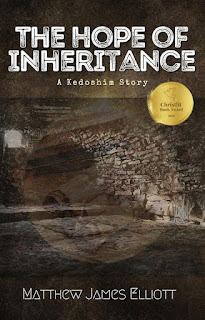 The Hope of Inheritance: A Kedoshim Story by Matthew James Elliott is a poignant biblical historical fiction novel that delves into the tumultuous period of early Christianity following the Great Fire of Rome in 64 AD. The narrative vividly portrays the immense suffering and persecution endured by believers under the tyrannical rule of Emperor Nero. Inspired by extensive research into the New Testament's Book of Hebrews and the author's personal journey through adversity, the story is a testament to the enduring power of faith and hope in the face of unimaginable hardship.
The Hope of Inheritance: A Kedoshim Story by Matthew James Elliott is a poignant biblical historical fiction novel that delves into the tumultuous period of early Christianity following the Great Fire of Rome in 64 AD. The narrative vividly portrays the immense suffering and persecution endured by believers under the tyrannical rule of Emperor Nero. Inspired by extensive research into the New Testament's Book of Hebrews and the author's personal journey through adversity, the story is a testament to the enduring power of faith and hope in the face of unimaginable hardship.The story unfolds primarily through the eyes of Nathaniel, an apprentice scribe under the tutelage of Luke, the beloved physician and close companion of the Apostle Paul. Luke's letters to John Mark, and Theophilus form a significant part of the narrative, detailing the harrowing experiences of the burgeoning Christian community. These letters paint a stark picture of life in Rome, where Christians were scapegoated for the fire, leading to widespread arrests, torture, brutal crucifixions, and being burned alive as macabre human torches to illuminate Nero's gardens.
Amidst this relentless persecution, the core of the story revolves around the resilience and unwavering faith of the early Church leaders and their followers. Paul, recently returned to Rome, works tirelessly alongside Luke to rebuild the fragmented Christian community. They are joined by other steadfast figures such as Silas, a master scribe, and young leaders like John Mark and Timothy, who bravely continue the ministry in Rome and Ephesus despite the constant threat of capture and execution. The novel also touches upon the fate of other prominent apostles, including Peter, who is arrested and subjected to barbaric treatment after courageously preaching the Gospel.
The characters grapple with profound grief and loss as their loved ones and fellow believers are martyred. The book explores how they confront feelings of abandonment and despair, yet ultimately find solace and strength in their shared faith. Theophilus, a missionary and a trusted friend, plays a crucial role by offering counsel to Paul during his trial, underscoring the deep bonds of fellowship that sustained the early Christians.
A central theme is the miraculous restoration of hope and the continuous rebuilding of the Christian community even as their numbers dwindle under persecution. Despite the horrific circumstances, the believers exemplify compassion, tending to the sick, and continuing to spread the message of the Gospel. The novel highlights their unwavering conviction that their suffering serves a divine purpose, reinforcing the idea that true inheritance lies not in earthly gains but in eternal hope. "The Hope of Inheritance" is a compelling narrative that underscores the resilience of the human spirit and the transformative power of faith, even when confronted with the darkest aspects of human cruelty.
July 1, 2025
Book Reviews: The Strength of Samson by Tyler Kraft
Greetings,
This is a review of The Strength of Samson, a debut novel from Tyler Kraft. It was released on June 27th, 2025. I was given the opportunity to be a part of his Advanced Reader Team. I have chosen to review this book, and all of these words are my own.
See you in The Pages,M.J.E.
Overall Rating: ★★★★★
Overall Description: The only thing more powerful than Samson’s supernatural strength is his desire to escape the pressure of being Israel’s savior. Marked from birth by God to free his nation from the oppression of the Philistines, Samson is repeatedly overwhelmed by other people’s expectations. This relentless pressure drives him to a life of breathtaking contradictions as he seeks to find comfort in the arms of his enemies.Torn between his divine destiny and human passions, Samson tries to remain faithful to God. But as moments of weakness become a way of life, an ultimate betrayal robs him of his strength and threatens to end his divine mission once and for all. Samson must rediscover his true strength if he hopes to reclaim his God-given destiny and finally tear down the foundations of Philistine tyranny.
My Review of the Book:
Tyler Kraft’s debut novel, The Strength of Samson, was a joy to read and opens us up to the legendary story of Israel’s fierce judge to reveal a man torn between the calling placed upon him by God and human longing. This is a fresh yet faithful retelling that invites the reader to rediscover a familiar story. From the opening chapter, where we glimpse his divine purpose and imagine the struggles he may have faced as a child, to the redemptive finale rooted in scripture, Kraft’s vivid reimagining of this familiar story took me in. There are times when I pick up a book and wonder what I’m going to think once I’ve started reading it, and The Strength of Samson did not disappoint by any means. Rather than bending scripture to fit a modern lens, Kraft exercises remarkable restraint and creativity, sketching thoughtful possibilities within its sacred framework. When it comes to the Biblical Fiction genre, I hope to always see something that is well written and that echoes the scriptures. I was quite impressed with how Kraft weaved this story around the account of Samson in Judges 13-16.The fictional aspects of this story are plausible and kept me more than entertained. One of my favorite aspects of the story was the relationships that the author developed between Samson and his family. To be honest, I’d never given much thought to that part of Samson’s story until now. There were several occasions where I honestly started to understand more about who Samson was and the way he could have perceived the world around him. What surprised me most is how Kraft turns a tale usually framed as betrayal and downfall into something redemptive and human. Kraft weaves a quiet poetry through the narrative, and it resonated with me more deeply than I expected. Where I once saw just a man of massive strength and arrogance, I now see a more human idea. As a child, I always thought of this story as if Samson were some kind of superhero, and Kraft has changed my point of view on this. It is a fantastic exploration of the humanity behind Samson’s story. I am excited to see where Tyler Kraft takes us in his next novel, and I am encouraged by the creative talent he exhibits through this story. There are so many opportunities to learn from scripture through Biblical Fiction, and this author is one of the few who have captured what I’m looking for when I am reading this genre.I received an advanced reader’s copy of this book and chose to leave this review. My words are my own and well-deserved. Fans of scripture-based storytelling will find this story a beautiful blend of drama, poetic insight, and history coming alive. I’ll be returning to these pages, and to Samson’s story, again and again.
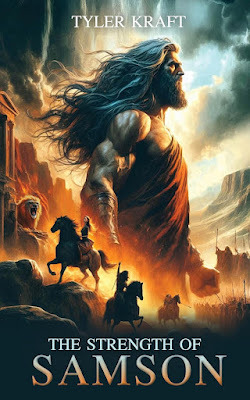
June 15, 2025
Unexpected Legacies: Silas, The Scribe ***REPOST***
Greetings,
This is a throw back to my post on the HHH Blog on January 1st, 2025. You can see the original post here. I am re-posting this here as an introduction to a few posts that will be added to help me build consistency in my posts. May you find encouragement through it.
---
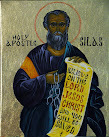 Ancient Painting of SilasScribes in the early church make for an interesting study. Silvanus, also known as Silas, is among them. The New Testament offers insights into who they were and what role they played. Similar to John Mark, Silas committed himself to ministry. He traveled with Peter and Paul, supporting their evangelistic work. He was a scribe for them both. Scribes, according to the dictionary, were not just writers; they were members of a powerful elite, who had a good standing and respect. Educated and learned, they served as teachers, editors, and historians, committed to the study of sacred texts.
Ancient Painting of SilasScribes in the early church make for an interesting study. Silvanus, also known as Silas, is among them. The New Testament offers insights into who they were and what role they played. Similar to John Mark, Silas committed himself to ministry. He traveled with Peter and Paul, supporting their evangelistic work. He was a scribe for them both. Scribes, according to the dictionary, were not just writers; they were members of a powerful elite, who had a good standing and respect. Educated and learned, they served as teachers, editors, and historians, committed to the study of sacred texts. Today, the Bible is available to pretty much anyone who needs it. Those who served as scribes in the early church played a role in making this a possibility. Without them, we would have nowhere close to the amount of history that we have today. They were the keepers of history in a lot of ways. Although not always the original authors, these scribes preserve the historical accounts we have today. They preserved the inspiring words of those who shared their thoughts and ideals with their people.
 AI Generation of an Ancient ScribeAlthough Silas worked as a scribe, he was also a respected member of the Jerusalem church. He traveled with Paul on his second missionary journey (2 Corinthians 1:19) and also experienced the harsh realities of imprisonment. There are even moments in scripture where he endured beatings just like Paul did (Acts 16:16-20). According to scriptures like 1 Peter 5:12, there is a strong indication that Silas accompanied Peter on missionary journeys as well. While Silas spent time with both of them, he also had his own missionary work. There is substantial evidence Silas spent a great deal of time in Antioch of Syria (Acts 15:32). Many of those we learn about as traveling companions to Paul valued him.
AI Generation of an Ancient ScribeAlthough Silas worked as a scribe, he was also a respected member of the Jerusalem church. He traveled with Paul on his second missionary journey (2 Corinthians 1:19) and also experienced the harsh realities of imprisonment. There are even moments in scripture where he endured beatings just like Paul did (Acts 16:16-20). According to scriptures like 1 Peter 5:12, there is a strong indication that Silas accompanied Peter on missionary journeys as well. While Silas spent time with both of them, he also had his own missionary work. There is substantial evidence Silas spent a great deal of time in Antioch of Syria (Acts 15:32). Many of those we learn about as traveling companions to Paul valued him. Some experts even affirm that there is a strong possibility that he was the author of one of the most educational letters in the New Testament, The Letter of Hebrews. Francine Rivers wrote an entire book about it called The Scribe. Although the authorship of Hebrews remains a mystery, Silas’s involvement as a potential author highlights his significant role in the early church’s growth. I strive to avoid placing my own theories in these historical articles. My personal research has led me to believe that Silas was involved in writing Hebrews, at least. I am actually working on a book right now that speaks to this idea.
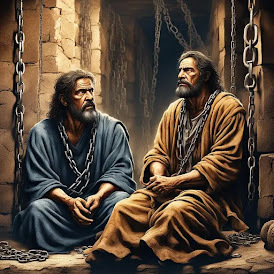 AI Generation of Paul and Silas in Prison
AI Generation of Paul and Silas in Prison The role that Silas played in the ministry of Paul and Peter was supportive, but there is a legacy in that type of ministry as well. Without support roles in the world we live in today, many things would go undone. Even in hard times, it’s the encouragement of others that keeps humanity going. People like Silas hold those in authority accountable for fulfilling their duty as leaders in society, regardless of what year it is. He is a great example of someone who used his gifts to serve others in humility and faithfulness. It is through that kind of loyalty that Silas becomes someone worth remembering.
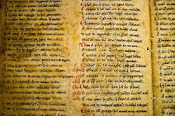 Ancient WritingIn all reality, the world of that time needed scribes like Silas to help build the foundations of the early church. Through everything, they stood by those they were called to support. We need more people like the scribes of the New Testament in the world today. With support like that, I am sure things would be much different. Scribes like Silas knew what they were getting into and were loyal to those they served. They were experts in an ancient, forgotten craft. The art of keeping records has fallen into a digital age and I, for one, believe in having those physical papers in hand.
Ancient WritingIn all reality, the world of that time needed scribes like Silas to help build the foundations of the early church. Through everything, they stood by those they were called to support. We need more people like the scribes of the New Testament in the world today. With support like that, I am sure things would be much different. Scribes like Silas knew what they were getting into and were loyal to those they served. They were experts in an ancient, forgotten craft. The art of keeping records has fallen into a digital age and I, for one, believe in having those physical papers in hand. While we have people today, such as copywriters and editors, there was something significant about scribes who had to take the time to create the papyrus and ink they used to write within their time. Those of us who consider ourselves writers today honestly have it much easier than the scribes of the New Testament era. With a humility that rivaled even the most loyal servants of their time, scribes left behind a legacy of loyalty that would be hard to match in today’s world. Silas was a significant part of that.
See you in the pages,
M.J.E.
June 8, 2025
Unexpected Legacies: Luke, The Healer ***REPOST***
This is a throw back to my post on the HHH Blog on December 1st, 2024. You can see the original post here. I am re-posting this here as an introduction to a few posts that will be added to help me build consistency in my posts. May you find encouragement through it.
---
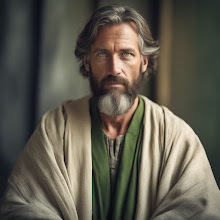 Luke AI GenerationLuke is one of those characters in the scriptures that you don’t think about often unless you’re in his gospel or the Book of Acts. He is often left to his own devices and never really thought of again once you get into Paul’s writings. He has his fifteen minutes of fame, so to speak, and then someone else takes the reins. It is a bit discouraging to think about if I’m honest.
Luke AI GenerationLuke is one of those characters in the scriptures that you don’t think about often unless you’re in his gospel or the Book of Acts. He is often left to his own devices and never really thought of again once you get into Paul’s writings. He has his fifteen minutes of fame, so to speak, and then someone else takes the reins. It is a bit discouraging to think about if I’m honest. The reality, though, is that he had a much more prominent role in the early church than most realize. If you break down the amount of literature in the New Testament, the two books that are officially attributed to him produce over 35,000 words of the New Testament. That is around 27%. If you use the charts in this article I found a while back. Paul comes in at around 23% and John comes in at around 20%. On that alone, Luke should be valued.
There is more to his story though, and while there is some serious speculation that Luke has a hand in writing the book of Hebrews as well, so there is no doubt that Luke was just as foundational to the beginnings of the new church as the apostles. So why does Paul garner most of the attention? Why is Luke pushed aside and left behind like dust in the wind? I believe the answer to this lies in his legacy. In all honesty, I have done so much research into who Luke was, I could probably write a book on his significance.
For the confines of this short posting, though, I will highlight a few of his more significant roles in the early church. The most obvious role he played in the early church was his close ties to Paul and John Mark. Out of everyone who traveled with Paul on his missionary journeys, I fully believe that Luke was his most trusted companion. While Timothy and Titus have their own letters, it was Luke who was there to minister alongside him in the most trying moments of Paul’s ministry.
 One of the more uncommon aspects Luke attributed to the growth of the early church was his ability to track down and research things like the life and times of Jesus when no one else would. It is a proven fact that Luke has the most complete story to tell in his gospel. The Gospel he wrote is the only one that starts his story at the birth of John the Baptist and finishes it with the ascension of Jesus. It is also the gospel that details the most teachings of Jesus, as well as his healing ministry.
One of the more uncommon aspects Luke attributed to the growth of the early church was his ability to track down and research things like the life and times of Jesus when no one else would. It is a proven fact that Luke has the most complete story to tell in his gospel. The Gospel he wrote is the only one that starts his story at the birth of John the Baptist and finishes it with the ascension of Jesus. It is also the gospel that details the most teachings of Jesus, as well as his healing ministry.Here is what may be an unexpected realization to those who read this post. Luke wasn’t even in the picture of the New Testament until Paul’s 2nd Missionary Journey. Everything that we know from his Gospel had to be researched. So, the beloved physician, as Paul so eloquently put it in Colossians 4:14-15, did his due diligence amid serving at Paul’s side for the better part of 12 years, in my most lenient estimation. It was through all of this research that Luke discovered everything he wrote about.
There is so much we can glean from having all of this information, and there are even those who believe that Luke and Titus were related, which would explain why Luke does not mention his name in the Book of Acts. I do not have a firm conviction on whether this is true, so I will give you the passages and you can determine that for yourself, 2nd Cor. 8:16-20 and 2nd Cor. 12:15-18. If they were brothers, the reason Titus is not mentioned in the Book of Acts is because of the kind of person Luke was. It demonstrates Luke’s great humility. If Luke did not even mention his own name in either his gospel or Acts, then why would he mention the name of his brother? It was not their culture to do so.
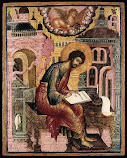 Artistic DepictionMost of what Church tradition acknowledges as Luke’s place of birth indicates that he was born in Macedonia or Antioch of Syria to a Macedonian family. Several commentators have attributed Paul’s vision of the man in Macedonia to Luke because that is where Luke first enters the picture. There’s also some significant connection with the name Theophilus, as that is who Luke is writing to in both of his books. Whether Luke knew him as a friend, or in some other way, they knew each other well. Often when we think of Luke, we feel like we have to associate him with Paul. However, there’s more to his story than being an associate with Paul.
Artistic DepictionMost of what Church tradition acknowledges as Luke’s place of birth indicates that he was born in Macedonia or Antioch of Syria to a Macedonian family. Several commentators have attributed Paul’s vision of the man in Macedonia to Luke because that is where Luke first enters the picture. There’s also some significant connection with the name Theophilus, as that is who Luke is writing to in both of his books. Whether Luke knew him as a friend, or in some other way, they knew each other well. Often when we think of Luke, we feel like we have to associate him with Paul. However, there’s more to his story than being an associate with Paul.There’s much more to say about who Luke was and what he accomplished as a fellow missionary in the early church. We can highlight his time teaching in places like Philippi or Caesarea, even the healing ministry he took part in himself. What remains in my eyes, though, is that he was a faithful servant to the ongoing mission of growth in the early church, a mission that required unwavering dedication and boundless enthusiasm. The pain Luke felt was just as profound as the suffering endured by figures like Peter and Paul. Although there’s no proof he was arrested or beaten, he saw many others endure these hardships. Despite all of this, he remained faithful to the mission and to those he was serving with. May our legacy in life be just as faithfully present as he was.
See you in the Pages,
M.J.E.
June 1, 2025
A Review from the CEO of ChristLit
I am so excited to share some of the review that The Hope of Inheritance received from the CEO of ChristLit Books Awards, Louise Jane. I am beyond grateful for this compelling 5 Star Review. It was a huge encouragement to read.
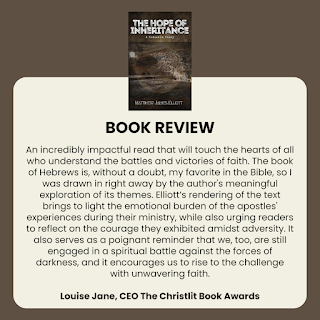
There is much more to the review, but I wanted to get some of it out there for you all. Below, I have copied and pasted some information about ChristLit Books Awards.
See you in the Pages,
M.J.E.
~~
Renowned across the globe, the Christlit Book Award program is dedicated to acknowledging and honoring remarkable authors who skillfully integrate themes of faith into their literary creations.
The program is known for showcasing powerful narratives that inspire and connect with audiences of every generation.
Our mission is to help authors get their titles into the hands of more people by providing them with a stamp of approval that they can use to build trust, credibility and increase interest.
By highlighting award-winning Christian titles, we're helping to ensure a more likely movement towards new and continued faith in God.
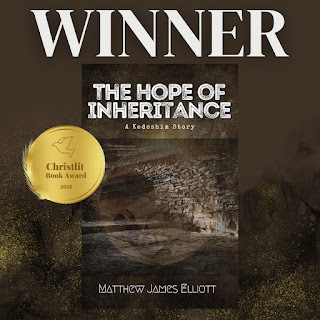
May 28, 2025
The Hope of Inheritance Wins ChristLit Book Award!
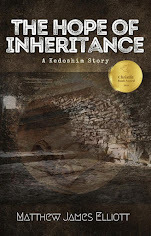 I’m thrilled to share some exciting news with you—
The Hope of Inheritance
, my upcoming release, has been selected as a recipient of a ChristLit Book Award!
I’m thrilled to share some exciting news with you—
The Hope of Inheritance
, my upcoming release, has been selected as a recipient of a ChristLit Book Award!This recognition is a tremendous honor, and I’m incredibly grateful to the ChristLit team for acknowledging the heart and message behind this story. The book is set to release on Father’s Day (6/15), making this moment even more meaningful.
The Hope of Inheritance is a story rooted in faith, legacy, and the enduring power of hope. I can’t wait for you to read it and experience the journey for yourself.
See you in the Pages,
M.J.E.
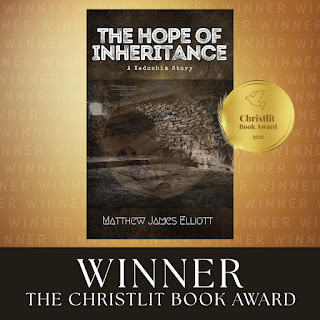
May 20, 2025
Book Reviews: Being Content God's Way by Scott Lapierre
Greetings,
This is a review for both the book and the workbook entitled Being Content God's Way by Scott Lapierre which was released today May 20th, 2025. I was given the opportunity to be a part of his Advanced Reader Team. I have chosen to review this book and all of these words are my own.
See you in The Pages,
M.J.E.
Overall Description:
Philippians 4:12 reveals a profound truth: there is a “secret to learning contentment.” As Paul declares in the next verse, he learned to be content from the strength Christ provides: “I can do all things through Christ who strengthens me.” Just as a tree’s unseen root system gathers vital resources for the tree, the unseen part of contentment is being “rooted and built up in Christ” (Colossians 2:7).
With Being Content God’s Way, you will…
learn to “be content with what you have” (Hebrews 13:5)enjoy personal stories and application to daily lifebe equipped to put off covetousness (Colossians 3:5)receive biblical answers to common questionsdiscover why “godliness with contentment is great gain” (1 Timothy 6:6-10)Being content in all things is not an elusive concept. Instead, it is a tangible reality within our reach through a relationship with Christ.
Be sure to check out the accompanying Being Content God’s Way Workbook. Click Buy Now to be equipped to let your conduct be without covetousness and be content with such things as you have.
My Review of the Book:
Scott LaPierre has been a staple in my library for several years. Many of his books have left me encouraged and educated in ways that I honestly did not know I needed to be educated in. Few books truly reshape how I view a biblical principle, but Scott LaPierre's books do. His new book, Being Content God's Way, is no different. In fact, it is his best work yet, and I am so honored to have the privilege of reviewing it here on my website today.
This book is a powerful source for anyone wanting to know more about what being content truly means. What stood out most was how LaPierre contrasts covetousness and contentment—two sides of the same coin, yet rarely examined together. The idea of contrasting these two concepts is not something that has ever truly crossed my mind before, and LaPierre does a fantastic job of doing just that.
His message throughout the book is clear and well established with both Biblical influence and real-life examples of people who have learned to be content in any circumstances. He does not sugarcoat the message or throw any fluff into what he writes about within the confines of the book. I truly appreciate his honest and straightforward approach.
One chapter that resonated with me was Chapter 11: Godliness with Contentment. While I don't want to spoil the book for those who read this review, I must say, it is phenomenal. I learned a great deal regarding my own journey toward learning to be content God’s way from the lessons established in that chapter, and they echo everything else in the book.
The story about Horatio Spafford (the hymnist who wrote the song It is Well with My Soul) especially spoke to me as it is a story I know well. It is a powerful testimony and only one of many great examples of the content offered in this book. Beyond just gaining knowledge, this chapter challenged me to examine how I approach contentment in my daily life—whether in seasons of abundance or difficulty.
I know this will be a resource I add to my library to keep referring back to for many years to come. For those looking to deepen their understanding, the accompanying workbook is a fantastic tool for applying these lessons to daily life.
I was given an advanced reader's copy of this book and chose to leave this review. My words are my own and well-deserved. LaPierre’s words don’t just instruct—they challenge, refine, and transform. I know this book will remain a cornerstone in my library for years to come.
My Review of the Workbook:
Throughout my spiritual journey, workbooks have been invaluable, helping me engage more deeply with biblical studies. When I heard Scott LaPierre was creating workbooks to accompany his books, I was thrilled. Each workbook serves as a thoughtful guide, helping readers internalize LaPierre’s message.
The Workbook for Being Content God's Way is no different. It’s easy to follow, with thought-provoking questions that reinforce the message of each chapter. LaPierre’s encouragement throughout speaks to his heart as both a pastor and educator, making the experience even more enriching.
This is a resource I’ll return to often, and one I highly recommend to anyone seeking biblical contentment. I was given an advanced reader's copy of this book and chose to leave this review. My words are my own and well-deserved.
